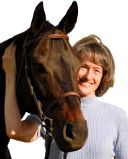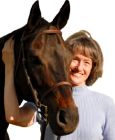Motivation
Racing for Human Motivation
A Personal Perspective: How ethical horse racing can inspire human lives.
Posted June 9, 2023 Reviewed by Vanessa Lancaster

Recent sports news is full of talk about Churchill Downs, where 12 horses died over the past six weeks. But the sad fact is that Churchill Downs is not particularly unusual. Altogether, 7200 American horses died from racing injuries or track illnesses from 2009 to 2021. I’ve written two posts on Psychology Today explaining why horse deaths occur and how to prevent them. As the Belmont Stakes weekend approaches, I’d like to consider a stronger question.
Given legitimate problems in racehorse welfare, why should we try to protect the sport of horse racing? Answer: because it can have a positive effect on human lives. Today, on the 50th anniversary of Secretariat’s Triple Crown win, I’d like to describe the effect he had on me. It generalizes to human motivation everywhere.
In 1973, I was a young teenager at high risk. My parents were absent, I had finished high school three years early, and I was isolated from teachers, classmates, friends, and relatives. I had no money. I lived at a ranch where I rode horses 12 hours a day, seven days a week, for a shared bedroom and meals. The experience taught me a lot about horses but nothing about the outside world. I was dangerously naïve. Without the adult intervention that no one seemed willing to provide, I would sink, and I knew it.
Everyone in the horse world had seen Secretariat win the Kentucky Derby and the Preakness on TV. So on Belmont Day, I came in from the barn hot, hungry, and dirty and joined a few other kids watching the race. As Secretariat bounded out of the starting gate, everyone but me whooped. I just watched, shy of expressing my feelings. But my eyes and ears were riveted on the chestnut powerhouse that filled the screen.
Secretariat held the lead to about halfway, then began to stretch his legs. He left the field behind, running faster and faster with no whipping or external encouragement, gobbling the ground, a herd animal fleeing from the comfort of his buddies. Typically, a horse wins a race by a length or two, maybe five at the max. Secretariat won by 31 lengths. Google the Youtube video right now if you’ve never seen it, and prepare to be wowed.
We–even I–cheered the horse on as he began to pull away from the group. We stood and crept forward to get a closer view. As the gap kept growing, we quieted. What was there to say? Our mouths dropped open, and goosebumps began to rise on our bodies. It was like witnessing a miracle. To me, Secretariat’s performance was more memorable than Kennedy’s assassination, the Challenger explosion, or Neil Armstrong’s first step on the moon.
There was a young horse–much like a young teenager–who was running his own race. He didn’t need to be whipped to perform; he didn’t need cars or clothes, cash allowances, or a family, or constant instruction. He just needed one empty slot on a dirt track and the freedom to move forward. He didn’t run fast because other horses were pressing him on. He wasn’t competing with them. He was independent of them and largely independent of his excellent jockey, Ron Turcotte–who knew enough, sitting on the fastest horse in the world, to just shut up and ride.
It was the most remarkable achievement I have ever seen. When the race was over, my teenage peers and I stood staring at the television, completely silent. Tears were running down most of our faces. My body felt electrified as if struck by lightning. We remained motionless for several minutes before someone began to stir. I am certain that every person in the room remembers that moment to this day, as do millions of others who stood in their rooms staring at their TVs.
It’s rare to be able to pinpoint one pivotal psychological moment in a human life. But on that day–June 9, 1973, at about 2:35 pm–I learned from a horse race that I might be able to perform without the help that others took for granted: Parents, money, teachers, a home, family, friends, coaching, adult advice, a leg up. It wouldn’t be ideal, but it might work.
Secretariat had run his own race; why couldn’t I run mine? Secretariat hadn’t cared what his peers were doing as they ran their best at Belmont. It was none of his business and none of his concern. In effect, they were running a different race. Secretariat was relying on his own strength, endurance, and knowledge. And he wasn’t trying to beat anyone or demean their efforts. He was in a class all his own, doing what he was built to do.
For days after the race, one thought echoed in my teenage mind: “If he can do that, then I can do this.” That belief made all the difference. It became a driving force in my life. Despite my setbacks, I was not powerless, helpless, or hopeless. At the time, this realization came as an enormous surprise.
Now you might wonder why an animal would arouse greater motivation in observers than a human athlete would. After all, it was Secretariat–not his jockey–who inspired millions. There are many reasons: People are fascinated by the size, beauty, and sheer power of horses. Horses operating with prey brains introduce us to new ways of experiencing events without evaluation or judgment. They show us how to do more and worry less. People with histories of trauma or abuse are especially likely to see animals, rather than humans, as trustworthy role models. They’re safer. And people learn to respect animals when they see ethical horse care, with all the strict welfare requirements that horse racing must adopt.
Every sport has an effect on human psychology. That’s why we have sports! Horse racing must change to improve equine welfare, and I will continue to argue for those changes. But let’s not throw out the baby with the bath water. In two minutes and 24 seconds, the Belmont Stakes of 1973 taught me so much about life. It awakened my hope and my determination to become more. In an instant, I was given a glimpse of the future that would remain with me always, the glimmering of an idea that maybe, someday, I could make something of myself.




